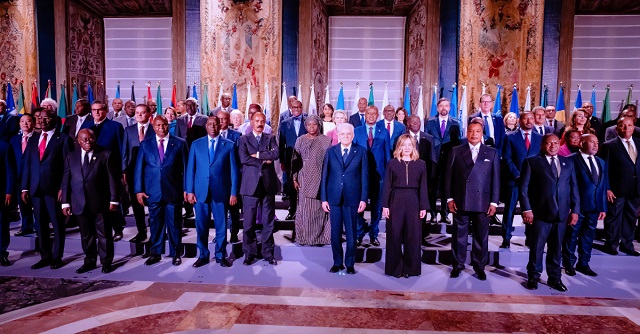
Speakers at inaugural Italy-Africa Summit demand treatment as equals
NEWS ANALYSIS | RONALD MUSOKE | Italian Prime Minister Giorgia Meloni’s call for “a new Italian partnership with Africa” has been put under tough scrutiny by analysts with some calling it a design for a new form of colonialism.
On Jan. 29 the Italian government unveiled its new partnership with Africa that will see the European country support economic development in Africa worth US$5.95 billion.
Giorgia Meloni announced the new plan during the inaugural Italy-Africa Summit that took place in Rome.
The summit which was held under the theme, ‘A Bridge for Common Growth’ took place weeks before Italy assumes the Presidency of the G7, and a few weeks ahead of the 37th Ordinary Assembly of the African Union in Addis Ababa.
Meloni said Italy was keen to play its ‘natural role’ as a bridge between Africa and Europe and that Africa would be the main priority for Italy’s G7 presidency. The Italian premier announced various initiatives designed to bolster economic links and create an energy hub for Europe while curbing African emigration to Europe.
The initiative known as the “Mattei Plan” is worth €5.5 billion (US$5.95 billion) including guarantees and it focuses on five priority areas; education, agriculture, water, energy and migration.
“We believe it is possible to envision and write a new chapter in the history of our relationship, a cooperation among equals, far from any predatory imposition or charitable stance towards Africa,” said Meloni.
“There is a natural inclination for Italy to be a bridge between Africa and Europe. The whole world cannot think about the future without Africa.”
In attendance of the summit was Ursula von der Leyen, the President of the European Commission. She called for a united front in cracking down on people smugglers. “The best way to do this is to join forces and crack down on the criminals, and in parallel, build alternatives to the deadly smuggling routes,” she said.
“When Africa prospers, Europe prospers and the whole world can,” said Roberta Metsola, the President of the European Parliament, who also attended.
The summit attracted up to 25 African leaders including; Moussa Faki, the African Union Chairperson, President Azali Assoumani of Comoros, President Macky Sall (Senegal), President Nana Akufo-Addo (Ghana), President William Ruto (Kenya), President Denis Sassou-Nguesso (Republic of Congo), and President Hassan Sheikh Mohamud (Somalia). Others were President Emmerson Mnangagwa (Zimbabwe), President Kais Saied (Tunisia), President Filipe Nyusi (Mozambique), President Isaias Afwerki (Eritrea), Prime Minister Abiy Ahmed (Ethiopia), Prime Minister Ulisses Correa e Silva (Cabo Verde). Prime Minister Robinah Nabbanja represented Uganda.
Mattei Plan is an ‘empty box’
However, although the AU Chairperson Moussa Faki welcomed the pledged support, he noted that prior consultation with the African continent would have been preferred, particularly when the Mattei Plan was being drafted.
Faki noted how Africa is a continent currently grappling with challenges of insecurity, ecology, health, mobility, technology, financing for development, and integration.
Faki told the summit that designing Africa’s priorities must obviously emanate from these challenges. He said the development of Africa remains dependent on African will and vision but also on the structuring of the international economic order and governance.
According to Faki, as per the vision designed by the strategic framework of the African Union, Agenda 2063, the priorities are agriculture, infrastructure, environment, energy, health, education, and digitalization.
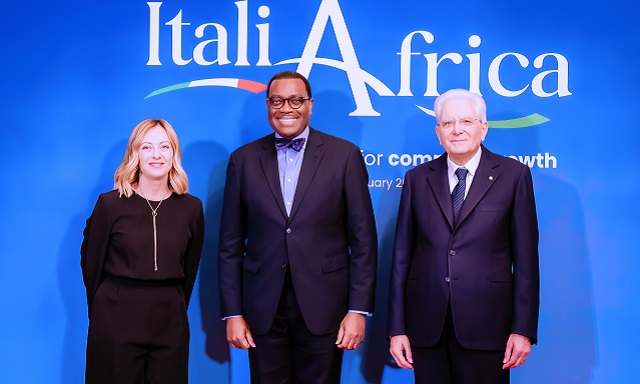
“I understand that the Mattei Plan proposed by Madam President of the Council (Giorgia Meloni), about which we would have liked to have been consulted is consistent with this,” he said, “Africa is prepared to discuss the aspects and modalities of its implementation.”
Faki added: “I must stress, here, the need to match actions with words. You will understand that we cannot be satisfied with promises that are often not kept.”
Faki was not the only critic of the Mattei Plan which was named after the founder of the Italian petroleum giant, Eni. Representatives from some environmental groups said the Mattei Plan made little mention of climate change which is one of the major drivers of illegal migration of Africans to the Italian peninsula.
Silvia Francescon, the Senior Foreign Policy Expert at ECCO, an independent Italian think tank on climate change, said “for the Mattei Plan to be truly innovative and inclusive, we expect an opening towards Italian and African civil society, which was absent from today’s Summit.”
“Climate and energy are confirmed to be the central pillar of the Plan, but several ambiguities remain,” she said, “There is no clear reference to the international commitments on climate, reaffirmed by the Italian Government also at the latest COP28 in Dubai.”
“This risks turning into a missed opportunity if the Plan’s objectives do not align with climate commitments and transition opportunities,” she said.
Simone Ogno, the Finance and Climate Campaigner at ReCommon, another Italian non-profit that challenges corporate and state power, said the “Mattei Plan is an empty box.”
“PM Giorgia Meloni has talked about pilot projects, but the risk is that the Plan will be filled with projects that are harmful to African populations, starting with those related to fossil fuels. On top of that, there is the participation in the steering committee of actors such as Eni and SACE.”
“Can those same actors who potentially have interests to see their own investments included in the Plan be part of the directorate? For this reason, as long as the Plan does not have well-defined guidelines and content precise, we call for a moratorium on all fossil projects concerning Africa that involve Italian companies, in order not to influence the Plan and so that not a single euro of public money is spent on these.”
For Dean Bhekumuzi Bhebhe, the Campaigns Lead at Power Shift Africa, a non-profit that aims to mobilize climate action in Africa by amplifying African voices in the media, the summit risked becoming a precursor for a new form of colonialism.
“Africa stands at a critical point given the climate crisis and if we do not call out convenings such as the Italy-Africa Summit, we stand to allow a new form of colonialism to take shape on the continent, and spread inequality across its landscape.”
He said Africa cannot be developed through gas infrastructure. “If the “Mattei Plan” is to succeed, we need genuine solutions centred around renewable energy,” he said, adding that: “Beyond solutions, we need transparency and inclusivity.”
“Beyond inclusion we need African voices. Africa is for Africans and only we reserve the power to define our developmental future. The process of locking – in Africa to outdated, outmoded and obsolete fossil fuel extraction is a future we cannot endorse.”
Lorena Stella Martini, the Foreign Policy Advisor at ECCO noted days ahead of the Italy-Africa summit that Italy needs an innovative and bold strategy different from past models. She said the Mattei Plan needed to represent an equitable, non-paternalistic approach towards the African continent.
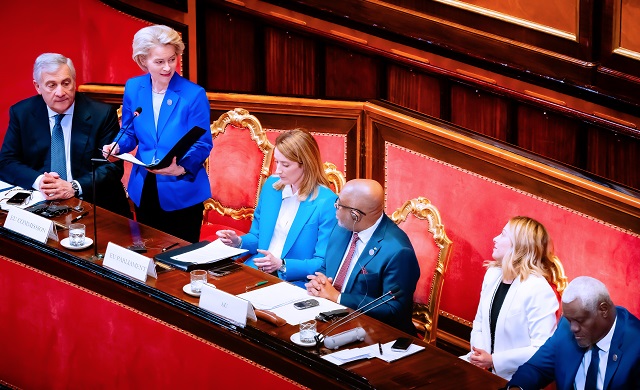
Martini said the framework needed to consider Africa’s demographic scenarios which present an exponential growth and is increasingly facing severe impacts of climate change. She said, in order for Italy to become a real strategic partner for the African continent in the long-term, the European state should embrace the opportunity offered by the green growth and the energy transition.
“This means, first and foremost, focusing on renewable energy sources,” she said, “The focus should also be on critical raw materials, which are key for the energy transition, as well as on supporting other economic sectors which can represent an alternative to the fossil fuel industry, and on the promotion of policies of adaptation to climate change.”
Africa’s the future
Speaking at a session on economic and infrastructure cooperation, Dr. Akinwumi Adesina, the president of the African Development Bank (AfDB) welcomed Italy’s ‘Mattei Plan for Africa,’ and its prioritization of energy security.
The Bank Group chief commended the Italian government for the Rome Process Financing Facility, which will provide €100 million (90% of which is concessional financing) towards support for infrastructure in Africa, especially for renewable energy, energy efficiency projects, water and sanitation, and agriculture initiatives, as well as vocational training and job creation.
He said Africa’s economic trajectory was compelling and highlighted the bank’s key role in supporting African countries.
“With a population of 1.4 billion, the largest youth population in the world, the largest renewable energy sources in the world, the largest deposits of critical minerals and metals globally, and the largest share of uncultivated arable land left in the world, Africa will determine the future of the world,” Adesina said.
Adesina underscored Africa’s economic resilience, noting that despite global economic headwinds of climate change, conflicts, and a pandemic, the continent had stayed strong, with real GDP growth of 4.1% in 2022, higher than the global average of 3.5% for the same period.
To address a key challenge to Africa’s accelerated development, notably a large infrastructure financing gap of roughly US$68–108 billion annually, he told leaders that the African Development Bank had invested US$44 billion in infrastructure over the last seven years. He said this was for the development of ports, railways, transport corridors, energy and digital infrastructure.
Adesina addressed the challenge of illegal migration from African countries, stressing that it was critical to continue to support economic growth and development of African nations, reduce fragility and build resilience.
 The Independent Uganda: You get the Truth we Pay the Price
The Independent Uganda: You get the Truth we Pay the Price
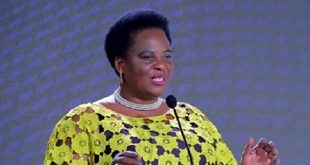

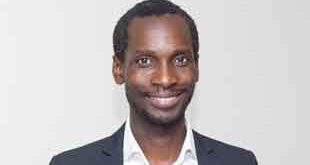
Beggars hoping for beggars money, in order to continue begging…..